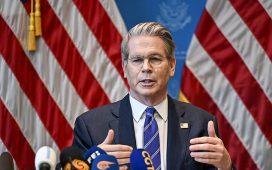Stay informed with free updates
Simply sign up to the ESG investing myFT Digest — delivered directly to your inbox.
BlackRock has thrown its weight behind a coalition of US police and firefighter labour groups that is making the case for getting politics out of pensions, in its latest effort to navigate the backlash to environmental, social and governance investing.
The world’s largest money manager is the only financial group among the founding members of the Alliance for Prosperity and a Secure Retirement, a Delaware-registered non-profit that warns on its website that “politics has no place in Americans’ investment decisions”. After coming under fire over its advocacy for sustainable investing, BlackRock has increasingly highlighted the primacy of investor choice.
A handful of small business and consumer non-profits are also members of the alliance, which launched earlier this year amid a flurry of ESG-related activity. Forty-four state legislatures considered 162 bills in 2023, and 76 more proposals have been put forward this year, according to law firm Ropes & Gray. Roughly 80 per cent of the proposals sought to ban consideration of sustainability factors, while the rest actively promoted it.
“We are not pro-ESG. We are not anti-ESG. What we are is ‘pro’ letting investment professionals, who have a fiduciary duty to their beneficiaries, do the work that they’re supposed to do,” Tim Hill, a retired Phoenix firefighter who is president of the alliance, told the Financial Times. “We are ‘anti’ politicians, from either the right or left, interfering with that fiduciary duty so they can carry out a political, social agenda.”
Hill said the group had been set up to rally pension industry participants in support. “We decided we were going to try and take this different tack of enlisting the industry to assist us, primarily in the financial burden of pushing back and protecting our funds and fund managers,” he said.
BlackRock said in a statement that it was “proud” to back the alliance, adding: “As a fiduciary, our mission is to help more people experience financial wellbeing in all phases of life. The alliance is one of many organisations that BlackRock supports which are committed to helping more Americans retire with dignity on their own terms.”
The $10.5tn money manager has been at the centre of the political fight over ESG since 2020 when chief executive Larry Fink beat the drum for sustainable investing, pledging in his annual letter to make “sustainability integral to portfolio construction and risk management . . . governments and the private sector must work together to pursue a transition that is both fair and just”.
BlackRock became a target for both Republican politicians who objected to what they described as “woke capitalism” and progressives who wanted the firm to go further in forcing its investee companies to decarbonise.
In the past three years, BlackRock’s stewardship has become much more sceptical of climate-related shareholder proposals. Last year it voted against most of them, saying the others were too prescriptive or were not in the financial interest of its clients. At the same time, assets in the firm’s largest ESG fund have halved since late 2021.
BlackRock revamped its lobbying and public relations operations last year, and Fink has been putting far more emphasis on pensions policy and infrastructure investment. He used his 2024 letter to warn of a looming retirement crisis caused by changing pension and working patterns.
BlackRock’s website lists the Alliance for Prosperity as one of 13 organisations that it is working with to encourage discussion of retirement issues. The group is backed mostly by public safety unions, which have a history of being more conservative on climate and social issues than some of their counterparts in service industries. It also includes a federation of builders’ unions whose pension funds have $800bn in assets, including the US’s largest electricians’ union.
The group has approached more liberal unions, including at least one big teachers’ union but so far none have them have joined.
Hill said that for several years, labour groups and pensioners have grown more concerned that politicians view pension funds as “a pot of money that they could use to enact whatever their current political or social agendas were”.
“It’s always labour who does the work, pays the political cost, and pays the financial cost to defend [pension systems], typically without any help from the rest of the industry,” Hill said.










